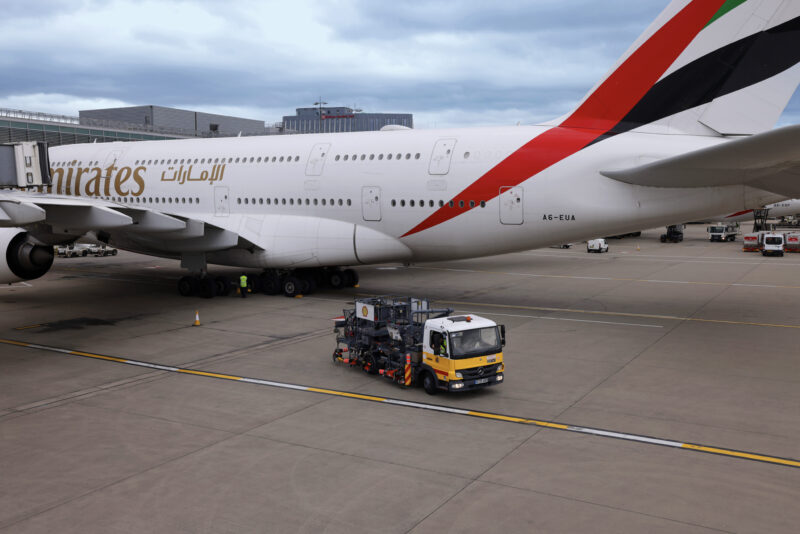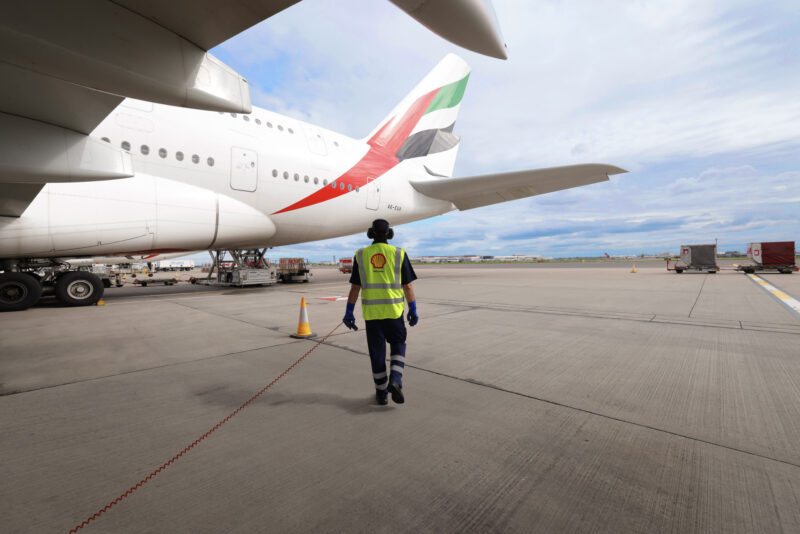Emirates is expanding its Sustatinanable Air Fuel (SAF) usage at London Heathrow, with the airline taking delivery of over 3000 metric tonnes of neat SAF from Shell Aviation.
This will be blended with conventional jet fuel and will be supplied into the fuelling infrastructure network of the airport until the end of summer 2024.
It will mark the the first time the airline will be using SAF to power some of its flights at London Heathrow and represents the largest volume of SAF it has purchased to date. Emirates is participating in London Heathrow’s SAF Incentive Programme, which ensures its affordability and accessibility for airlines operating at the airport.
The airline will be accounting for, tracking and tracing the delivery of SAF at London Heathrow as well as its sustainability attributes through robust reporting methodologies. The SAF that Emirates has purchased from Shell Aviation will be safely dropped into existing airport fuelling infrastructure and aircraft jet engines. In its neat form, SAF can reduce lifecycle carbon emissions by up to 80% compared to using conventional jet fuel.
London Heathrow’s SAF Incentive was launched in 2022. It is a scheme that provides a support mechanism to reduce the premium price gap between conventional jet fuel and SAF by approximately 50% (bearing in mind SAF commands a significant premium compared to . Schemes such as the one at London Heathrow aim to accelerate supportive government policies, increasing the UK’s competitiveness by unlocking investment in clean energy investments like SAF production.
In Quotes
Adel Al Redha, Deputy President and Chief Operations Officer, Emirates Airline said:
“Emirates is eager to take this next step in our SAF journey with Shell Aviation and London Heathrow supporting us with this fuel supply arrangement in one of our biggest operations outside of Dubai. The LHR Incentive Programme will support the SAF market’s increasing momentum, allowing airlines like Emirates to take advantage of its availability and make it more commercially viable.”
“London Heathrow’s SAF initiative also demonstrates credible action to encourage the scale up and use of SAF by airlines, building local production capabilities grounded in real demand, in addition to developing capacities across the supply chain to blend, handle and distribute SAF more widely. We hope that the initiative receives collective support of government authorities to boost more investment in SAF production in the future. While Emirates explores opportunities to increase the use of SAF within our network, we’ll continue to take other steps to reduce our emissions, with a major focus around optimising flight operations including weight reduction of aircraft and charting more efficient flight routes, among other initiatives.”
Raman Ojha, President, Shell Aviation, added:
“After our successful collaboration with Emirates to supply SAF to Dubai (DXB) last year, we are pleased to continue our support for their sustainability journey by enabling the airline to decarbonise flights out of the UK. This development also marks further progress in the growth of our global SAF supply network. Our goal is to continue to work with forward-thinking players in the aviation industry, like Emirates and London Heathrow, to make SAF available in more locations around the world.”
Ross Baker, Chief Commercial Officer, Heathrow said:
“We are thrilled to support Emirates with Heathrow’s Sustainable Aviation Fuel (SAF) scheme. SAF is crucial to decarbonising long haul flights as it can cut the carbon on routes like London to Dubai without the need for new aircraft or infrastructure. Thanks to commitments from airlines like Emirates, we expect to support the use of up to 155,000 tonnes of SAF at Heathrow this year. Now we need to ramp up SAF production in the UK so the country can benefit from jobs, growth and energy security as more airlines make the switch to more sustainable fuels.”
Expanding SAF use
Emirates currently operates flights from Amsterdam, Paris, Lyon and Oslo with SAF, with plans to engage Neste for SAF to uplift from Singapore.
Last year, the airline collaborated with Shell Aviation to supply SAF into Dubai Airport fuelling systems for the first time ever, allocating the SAF to a number of flights.
As airlines seek to make a dent in the use of standard jet fuel, SAF is a solution, allowing for a drop-in replacement in most cases.
But an expensive solution.
Heathrow’s subsidy scheme should help convince airlines that SAF could be a good move if it helps plug the gap between the cost of SAF and normal fuel.
However, it’s still going to need the supply to feed the demand that airlines are wanting.
There, is a bigger challenge.
Welcome to Economy Class and Beyond. Your no-nonsense guide to network news, honest reviews, in-depth coverage, unique research, as well as the humour and madness I only know how to deliver.
Our Social Media pool has expanded. You can find us across most networks as @economybeyond on Twitter, Mastodon, BlueSky, Threads and Instagram!
Also, remember that we are part of the BoardingArea community, bringing you the latest frequent flyer news from around the world.

